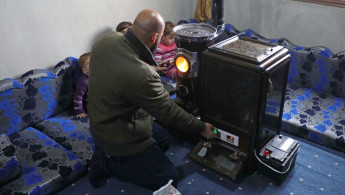70% of Syrian families in regime areas without fuel for winter
An estimated 70% of families living in Assad regime-controlled areas of Syria did not receive their share of subsidized heating fuel, regime authorities announced on Saturday.
The situation has caused great concern as families prepare to enter the harsh winter months with limited resources to face the cold.
The Syrian regime's Ministry of Internal Trade and Consumer Protection blamed the owners of fuel distribution vehicles for the alarmingly high shortage, and called for better planning and cooperation at the local level.
It said that vendors were selling the fuel too far away from where those eligible for the subsidized fuel live.
"The distribution of heating fuel to citizens has not started yet in the city of Jableh. The distribution was limited to a few villages around, and only one family accessed a ration of 50 liters," media activist Hossam Jablawi told The New Arab's Arabic language service.
"This ration can last five days, at best, for a family that owns one heater,” he added.
Syria's system of subsidies is implemented through a "smart card" system, through which families can access a quota of certain goods at a preferential price.
But the system has been marred by widespread corruption, with some regime officials diverting subsidized goods in order to resell them on the black market.
This year promises to be particularly difficult for families after the Ministry of Oil and Mineral Resources reduced the quota of subsidized fuel to 50 liters per family, compared to 200 liters in the previous winter.
The price of fuel nearly tripled this summer following the government's decision to reduce support to this sector.
The Assad regime blames Western sanctions for its inability to import more fuel, leading to shortages.
Syria currently imports most of its fuel from Iran, which has provided a credit line to the regime. Sanctions and the lack of foreign currency have discouraged most other countries from trading with Syrian authorities.
“I waited and was able to get 50 liters of diesel, which is a very small amount considering the long winter ahead," Ali, a teacher residing in Damascus, told the New Arab's Arabic service.
"The only heating method that we can rely on are blankets. Families must be patient and endure through the winter season," he added.





 Follow the Middle East's top stories in English at The New Arab on Google News
Follow the Middle East's top stories in English at The New Arab on Google News


